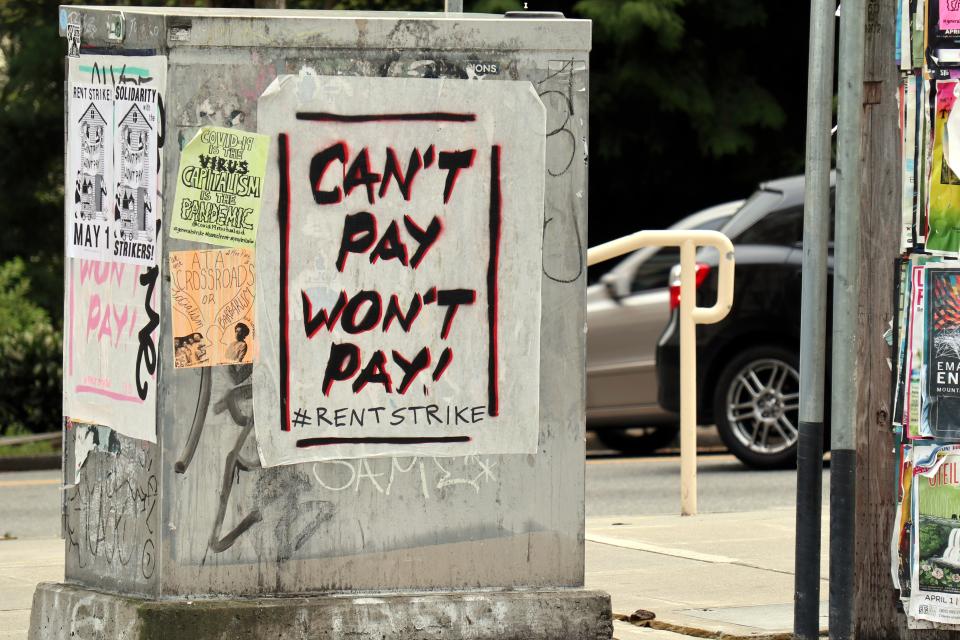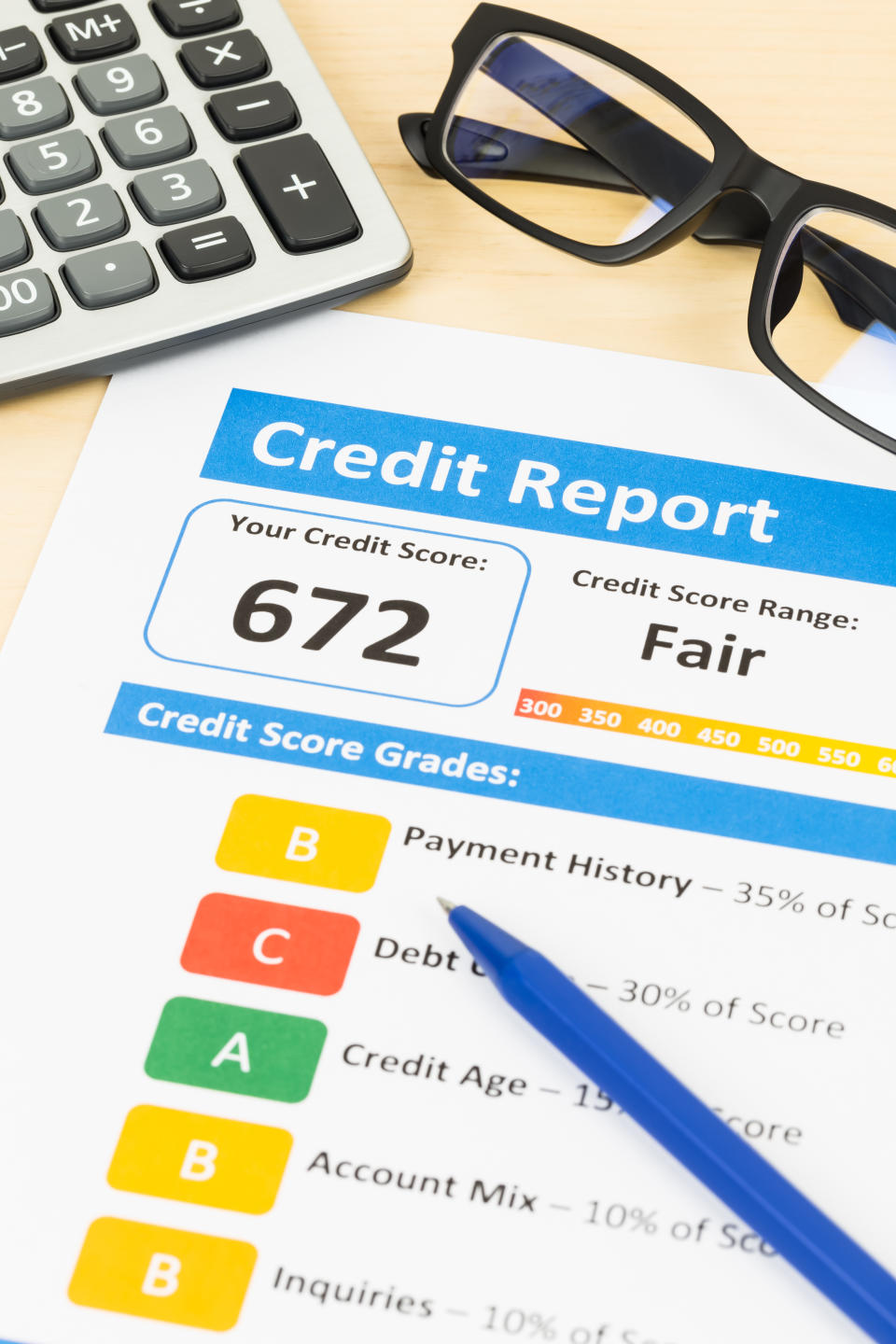Lost your job? Everything you need to know about being unemployed
So far, at least 30 million Americans are out of work as the coronavirus forced unprecedented shutdowns across the country. Many are struggling financially while they deal with a rapid decline in income.
They are worried about how to pay bills, keep food on the table, and where to turn for more financial assistance. They may also wonder how to find another job in an environment where in-person interviews violate the stay-at-home orders issued by many states.
Read more: How to deal with financial stress
Yahoo Money rounded up its best financial advice for these difficult times.
At a glance:
Government aid: Food assistance, health insurance, and unemployment benefits
Personal finances: Bills, credit, taxes, student loans, and retirement
Housing
Finding a job

Government aid
Food assistance
What is SNAP?
The Supplemental Nutrition Assistance Program, or SNAP, is the program formerly known as food stamps. Every household that receives SNAP benefits also receives an EBT, or electronic balance transfer card, with their funds that functions like a debit or credit card.
SNAP is a federal entitlement program, but each state manages its own program. For information about how to apply, visit your state’s SNAP homepage.
Do I qualify for SNAP?
Eligibility depends on your household’s total income and the number of people in it. After you apply, a state representative will call with additional questions to determine your eligibility.
Your monthly allowance is a sliding scale calculation based on your household income and size, expenses and combined assets. The larger your household size, the greater your monthly benefit.
How soon will I get my benefits?
Prior to COVID-19, states were able to process applications in under 30 days. Since applications have surged, states like Lousiana, have brought in additional personnel who are able to assist in application processing.
Read more: ‘Never applied before’: Americans are signing up for food stamps in droves
“We’ve responded by adding as many staff as we could to the effort. We shifted staff from other parts of the department and brought back former DCFS staff and retirees. Staff are working 10-hour shifts to manage the onslaught of applications and requests through our LAHelpU Customer Service Center,” said Marketa Garner Walters, secretary of Louisiana Department of Children and Family Services

Should I be embarrassed when shopping with SNAP?
The short answer is no. Take it from Ryan Clarke, a 39-year-old waiter from Rhode Island who was laid off from his job in March.
“Don't be embarrassed and seek help,” Clarke said. “There's no shame. If you've been working your whole life, there's no shame in taking this benefit.”
Health insurance
What do if you lose your health coverage?
Losing your employer-sponsored health insurance leaves you with three main options: Enrolling in COBRA or Medicaid, or signing up for the ACA marketplace.
Medicaid is the most affordable option. The expanded Medicaid programs, which cover low-income adults, are available in 37 states. Here’s how to apply for Medicaid.
The ACA marketplace is another option for people who’ve been laid off. You can qualify for a special enrollment period if you lost your health coverage through your employer. Find out more on how to get ACA health insurance here.
Your third option is COBRA, a health insurance program designed to allow people who have been laid off to continue the same coverage they got from their employer. You can find out more here on how to enroll in COBRA health insurance.
COBRA is considered by experts to be the most expensive option because “you're paying both what you were taking out of your paycheck every month plus what your employer was contributing,” said Dr. John Graves, an assistant professor in health policy at Vanderbilt University.
Unemployment
How much money will I get in unemployment insurance?
The overall unemployment benefit you get per week depends on your state. In New York, eligible workers can get between $104 and $504 a week, while in Nebraska, weekly benefits go up to $440.
Read more: Unemployment insurance: What it is and how to get it
The $2 trillion coronavirus relief package called the CARES Act provides an additional $600 a week for four months, in addition to the unemployment benefit workers would typically get with their state.
Do I get unemployment benefits if I’m furloughed?
If you have been furloughed, you may be eligible for unemployment benefits, depending on the state where you live and the duration of the furlough. If it lasts only a week and you don’t meet the state requirements you may be ineligible, according to Amber Clayton, the knowledge center director at SHRM, a human resources membership association.
Personal finances

What do I do about my bills?
Many companies are stepping in to ease payment burdens on behalf of their customers. Major banks, lenders, cell phone companies, insurance companies, and utilities are offering hardship programs to help Americans weather this financial storm.
Read more: Money-saving tips to stretch your paycheck
But you must contact them first to find out what type of relief you’re eligible for. Here’s a list of creditors offering coronavirus relief assistance. If your provider is not listed, contact your company directly to see if you can enroll in a skip-a-payment program or other hardship program.
Where can I get extra money?
National organizations like Goodwill, Salvation Army, and Red Cross have a local presence in many communities and can provide assistance to those in need. There are also local food banks and faith-based charities that can help when families require help accessing basic needs.
What about my taxes?
While tax day officially has been moved to July 15 from April 15, you might not want to delay filing your tax returns if you lost your job. That’s because a tax refund, which is on average about $2,700 this year so far, could help you with your drop in income.
What about my student loans?
The rates on certain federal student loans have been lowered to 0% under the CARES Act, while payments are suspended from March 13 through Sept. 30 of this year. Those who have private student loans should contact their lenders for relief options.
What about my credit score?
Experian, Equifax, and TransUnion are allowing Americans to check their credit reports free every week so they can monitor their financial health during the coronavirus pandemic.

You can look for errors, suspicious activity, and incorrect reporting by lenders that enrolled you in a hardship plan or forbearance program. The coronavirus relief legislation, the CARES Act, requires lenders to report that you are current on your payments if you and your lender have agreed to some type of relief.
Should I withdraw from my 401(k)?
You should withdraw funds from your 401(k) only if you have lost your job and your emergency savings have been depleted, according to financial experts.
“You should only take the money from retirement funds in extreme circumstances,” said Aaron Clarke, wealth advisor at Halpern Financial. “If this is the case, then of course you shouldn’t suffer in the interim until your employment, or financial situation, changes.”
Read more: 401k plan and how it works: The full breakdown
Under the recent CARES Act, you can withdraw up to $100,000 from your 401(k) without paying the 10% early withdrawal penalty as long as the distribution is coronavirus-related. Previously, if you were under 59 ½, you would have had to pay this penalty by the next tax period.
Income taxes on early withdrawals also can be spread over the next three years under the new law. If you pay back the entire amount you withdrew within those three years, then you’re excused from these taxes altogether.
Should I leave my 401(k) with my old employer?
Consider rolling your retirement account into an IRA due to low fees and greater control of investment options.
That can give you greater control during these volatile times, said Amit Chopra, managing partner at Forefront Wealth Planning and Asset Management. He said 401(k)s generally offer exchange-traded funds and mutual funds, which can limit you to a particular sector.
Read more: Coronavirus: Here’s what to do with your 401(k) if you lose your job
“You want control over what you’re owning at this time. You don’t want a big basket of stocks inside a particular industry such as consumer discretionary,” Chopra said.
Housing

What if I can’t pay my mortgage?
Gather documentation before speaking to your lender, which may include official notices showing you are no longer employed and your former employer’s contact information. Then, call your lender and ask what options you may have.
Explicitly state to your lender you have a coronavirus-related financial hardship.
Read more: Coronavirus: Here’s what to do if you can’t pay your mortgage
If you have a federally-backed mortgage, you may be eligible under the CARES Act to delay your mortgage payments by 180 days. After 180 days, if the need still persists, you have the option to delay by another 180 days.
“If you are facing financial hardship due to an interruption in your income, let your mortgage provider know as soon as possible so that you can understand what your options are,” said Glenn Brunker, a mortgage executive for Ally Home.
What if I can’t make rent?
If you can’t pay rent due to a coronavirus-related financial hardship, have an honest conversation with your landlord about deferring payments or negotiating rent. Before you sit down with your landlord, do your research.
Find out if your landlord has a federally-backed mortgage. If this is the case, your landlord can’t evict you for 120 days under the CARES Act if you can’t meet rent. One way to check if your apartment building is financed by a federally-backed mortgage is through this link: https://nlihc.org/federal-moratoriums.
Read more: Coronavirus: Here’s what to do if you can’t pay rent
Next, be aware of your state’s mandated moratorium laws for evictions, said Bruce McClary, spokesman for the National Foundation for Credit Counseling.
If the negotiations with your landlord fails, seek help from an accredited financial counselor. You can find one on the NFCC website.
“We have resources on a community level and charity level,” McClary said. “If it’s a daunting task to make 12, maybe 20 phone calls, you can get some help with the NFCC.”
Finding a job
How to use your time efficiently if you’re struggling to find a job?
“This is not the time to be applying to hundreds of jobs hoping one sticks,” said Allison McLean, career coach at Springboard, a remote learning platform.
What you can do instead is polish your application in the meantime. Start with adding your most recent experience and skills to your resume and LinkedIn profile and keep that updated while you’re actively applying for jobs.
Read more: Coronavirus: How to find a job in a tough economy
“Practice customizing your resume to the type of positions that you are likely to pursue,” Levit said. “Consider running it by a hiring manager in the field for review and feedback.”
The competition will be tough so improving your portfolio and materials is essential. What you learn and improve now will pay off in the long run — if not now.

How to find a job if I’m graduating in a tough market?
If you’re graduating this year, you may have a hard time job-hunting. Finding internships or jobs will be difficult, because many companies are reducing workforce, cutting budgets, and freezing hiring, according to Shweta Khari, a career expert at CareerBright.
“Your college or university career center is a fantastic resource for free online interview prep, resume writing, job search seminars and more,” said Lindsey Pollak, a career expert and author. “Most centers are also keeping track of what employers are hiring in this difficult time.”
If your school has moved your career fair online, make sure to attend it and make the most of it. If your summer internship gets canceled or doesn’t lead to the full-time position you were hoping to get, contact the recruiter and ask if there are any remote projects or tasks that you could do for them in the meantime, McLean said.
Who’s hiring?
For those who have been laid off or had their hours significantly reduced, there are ways to supplement income and find work in an industry that’s still growing despite the pandemic.
Not all retailers are struggling. Retail giants like Amazon and Walmart are increasing staff numbers to keep up with the capacity to fulfill orders. Pharmacies are considered essential businesses, and CVS and Walgreens are expanding workforces.
National and regional grocers like Publix, ShopRite, Trader Joe’s, and H-E-B are hiring in droves for additional hands in stores and online shopping fulfillment.
Read more: Here’s who’s hiring as millions of Americans lose jobs amid the coronavirus outbreak
Distance learning has replaced classroom learning for the time being, so companies like Outschool, Udemy, and K12 are hiring.
Food delivery restaurants like Domino’s and Papa John’s are hiring thousands to keep Americans fed during self-isolation. Instacart, goPuff, and Shipt are among the companies looking to add thousands of driver partners and field employees.
Communicating via a screen is now the norm for personal relationships and professional productivity. Companies like Zoom and Slack that make products so life in the virtual world is as seamless as face-to-face conversation are also adding employees.
Stephanie, Dhara, and Denitsa are reporters at Yahoo Money and Cashay. Follow them on Twitter at @SJAsymkos, @Dsinghx, and @denitsa_tsekova.
READ MORE:
'Fundraise for the most vulnerable': GoFundMe campaigns fill gaps before government aid kicks in
'Not going to happen': Couples call off weddings during pandemic, losing time and money
Read the latest financial and business news from Yahoo Finance and Yahoo Money
Follow Yahoo Finance on Twitter, Facebook, Instagram, Flipboard, SmartNews, LinkedIn, YouTube, and reddit.

 money
money 